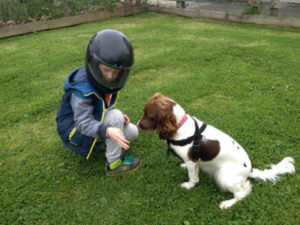
Our research suggests that very few dogs don’t show any form of behaviour that their owner finds problematic, however, what is seen as a ‘problem’ by one owner, may be considered a desirable trait by another e.g. a dog that barks when someone comes to the door. We also know that the behaviour that any dog displays, develops as a result of a combination of a number of factors, including their previous experiences, health, personality and genetics and whilst the actions of an owner may have influenced their pet’s behaviour, it is not usually a case of them being a ‘bad’ owner, but rather an unfortunate combination of events and sometimes bad advice!

The thing that I enjoy the most about clinical work is the opportunity to meet some incredible owners, who adapt their lives to accommodate their pets behavioural needs. Whilst people often tolerate undesirable behaviour, assuming that there is nothing that they can do about it, and others have tried and failed to change their dog’s behaviour, there is always something that we can suggest to make the dog-owner relationship more harmonious and improve the welfare of both human and pet!
If you are experiencing problems with your pet’s behaviour your first port of call should be your vet. Medical conditions can influence behaviour, so it’s important to rule out underlying medical problems before attempting to change any behaviour. Your vet will also be able to refer you to a qualified clinical animal behaviourist and will send your pet’s full medical history to them, so that they are aware of any previous or current conditions and any medication that your pet is receiving.
Many dog owners seek help from a trainer (some of whom might also call themselves a ‘behaviourist’ ) and whilst a good dog trainer can help you with training issues, such as returning when called, or walking nicely on a lead, where there is an emotional component to the behaviour e.g. Fear or anxiety, then you should see a Certificated Clinical Animal Behaviourist (CCAB). Like a human ‘Clinical Psychologist’, a Certificated Clinical Animal Behaviourist will have an approved academic qualification, as well as undertaking an extensive period of supervised clinical training. You can find a CCAB near you on this website:
http://www.asab.org/ccab-register
If you are interested in training as a Clinical Animal Behaviourist you can find more information here:
